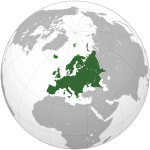Pọ́rtúgàl
Orílẹ̀òmìnira Pọ́rtúgàl Portuguese Republic República Portuguesa
| |
|---|---|
Orin ìyìn: "A Portuguesa" "The Portuguese Hymn" | |
![Ibùdó ilẹ̀ Pọ́rtúgàl (dark green) – on the European continent (green & dark grey) – in the European Union (green) — [Legend]](http://upload.wikimedia.org/wikipedia/commons/thumb/a/a0/EU-Portugal_with_islands_circled.svg/250px-EU-Portugal_with_islands_circled.svg.png) Ibùdó ilẹ̀ Pọ́rtúgàl (dark green) – on the European continent (green & dark grey) | |
| Olùìlú àti ìlú tótóbijùlọ | Lisbon |
| Àwọn èdè ìṣẹ́ọba | Portuguese |
| Lílò regional languages | Mirandese1 |
| Àwọn ẹ̀yà ènìyàn (2007) | 96.87% Portuguese and 3.13% legal immigrants (Cape Verdeans, Brazilians, Ukrainians, Angolans, etc.)[1] |
| Orúkọ aráàlú | Portuguese |
| Ìjọba | Orílẹ̀òmìnira oníléaṣòfin |
• Ààrẹ | Marcelo Rebelo de Sousa |
| António Costa | |
| Eduardo Ferro Rodrigues | |
| Formation Conventional date for Independence is 1139 | |
• Founding | 868 |
| 1095 | |
| 24 June 1128 | |
• Kingdom | 25 July 1139 |
| 5 October 1143 | |
| 23 May 1179 | |
| 1 December 1640 | |
| 13 February 1668 | |
• Republic | 5 October 1910 |
| 25 April 1974 | |
| Ìtóbi | |
• Total | 92,090 km2 (35,560 sq mi) (110th) |
• Omi (%) | 0.5 |
| Alábùgbé | |
• 2011 estimate | 10,647,763[2] (77th) |
• 2011 census | 10,555,853[3] |
• Ìdìmọ́ra | 115/km2 (297.8/sq mi) (96th) |
| GDP (PPP) | 2010 estimate |
• Total | $247.037 billion[4] |
• Per capita | $23,222[4] |
| GDP (nominal) | 2010 estimate |
• Total | $229.336 billion[4] |
• Per capita | $21,558[4] |
| Gini (1997) | 38.5[5] Error: Invalid Gini value |
| HDI (2010) | ▲ 0.795[6] Error: Invalid HDI value · 40th |
| Owóníná | Euro (€)2 (EUR) |
| Ibi àkókò | UTC0 (WET3) |
• Ìgbà oru (DST) | UTC+1 (WEST) |
| Irú ọjọ́ọdún | dd-mm-yyyy, yyyy-mm-dd, yyyy/mm/dd |
| Ojúọ̀nà ọkọ́ | right |
| Àmì tẹlifóònù | 351 |
| Internet TLD | .pt4 |
| |
Pọ́rtúgàl (![]() i /ˈpɔrtʃʉɡəl/ Pọrtugí: Portugal), lonibise bi Orileominira Portugal (Pọrtugí: República Portuguesa[8]), je orile-ede to budo si apaguusuiwoorun Europe lori Penisula Iberia. Portugal ni orile-ede to sunmo apa iwoorun julo ni Europe, be sini o ni bode mo Okun Atlantiki ni iwoorun ati ni guusu, bode mo Spain ni ariwa ati ilaorun. Awon isujo erekusu inu Atlantiki, eyun Azores ati Madeira je ara Portugal. Orile-ede yi gba oruko re lati ibi oruko ilu re totobijulo keji, Porto, ti oruko Latini re je Portus Cale.
i /ˈpɔrtʃʉɡəl/ Pọrtugí: Portugal), lonibise bi Orileominira Portugal (Pọrtugí: República Portuguesa[8]), je orile-ede to budo si apaguusuiwoorun Europe lori Penisula Iberia. Portugal ni orile-ede to sunmo apa iwoorun julo ni Europe, be sini o ni bode mo Okun Atlantiki ni iwoorun ati ni guusu, bode mo Spain ni ariwa ati ilaorun. Awon isujo erekusu inu Atlantiki, eyun Azores ati Madeira je ara Portugal. Orile-ede yi gba oruko re lati ibi oruko ilu re totobijulo keji, Porto, ti oruko Latini re je Portus Cale.
Ori ile to wa ninu bode Orileominira Portugal loni ti je titedo leralera lati awon igba iwaju itanakole: latowo awon Gallaeci ati awon Lusitanians, o bo si inu Ileobaluaye Romu be sini awon eniyan elede Jemani bi Suevi ati awon Visigoths na tedo sibe, ni orundun 8k awon Mauri bori ibe. Nigba Reconquista awon Elesin Kristi, Portugal seda ara re bi ileoba alominira, tori ni won se unpe bi orile-ede-ajoba togbojulo ni Europe.[9]
Ni orudnun 15k ati 16k, ntoripe o lewaju Igba Iwari, Portugal di ileobaluaye to nile kakiri Afrika, Asia, Oseania, ati Gusu Amerika, lati di ikan ninu awon alagbara itokowo, oloselu ati ologun lagbaye. Ileobaluaye Portugal ni ileobaluaye akariaye akoko ninu itan,[10] ati eyi to pejulo ninu gbogbo awon obaluaye alamusin Europe. Sibesibe, ipo orile-ede ti je riresile gan titi to fi di orundun 19k, agaga leyin ilominira ile Brasil, to je imusin totobijulo re.

|
Àyọkà yìí tàbí apá rẹ̀ únfẹ́ àtúnṣe sí. Ẹ le fẹ̀ jù báyìí lọ tàbí kí ẹ ṣàtúnṣe rẹ̀ lọ́nà tí yíò mu kúnrẹ́rẹ́. Ẹ ran Wikipedia lọ́wọ́ láti fẹ̀ẹ́ jù báyìí lọ. |
Àwọn ìtokasi
[àtúnṣe | àtúnṣe àmìọ̀rọ̀]- ↑ Àṣìṣe ìtọ́kasí: Invalid
<ref>tag; no text was provided for refs namedine.pt - ↑ Pordata, "Base de Dados Portugal Contemporâneo". Accessed on March 7, 2011.
- ↑ http://www.ine.pt/scripts/flex_v10/Main.html
- ↑ 4.0 4.1 4.2 4.3 "Portugal". International Monetary Fund. Retrieved 6 May 2011.
- ↑ "Gini Index". World Bank. Retrieved 2 March 2011.
- ↑ "Human Development Report 2010" (PDF). United Nations. 2010. Retrieved 5 November 2010.
- ↑ The Euromosaic study, Mirandese in Portugal Archived 2007-03-13 at the Wayback Machine., europa.eu – European Commission website. Retrieved January 2007.
- ↑ (Potogí) Portal do Governo[Ìjápọ̀ tí kò ṣiṣẹ́ mọ́]
- ↑ Brian Jenkins, Spyros A. Sofos, "Nation and identity in contemporary Europe", p.145 Routledge, 1996, ISBN 0-415-12313-5
- ↑ Melvin Eugene Page, Penny M. Sonnenburg, p. 481
- Pages with reference errors
- Webarchive template wayback links
- All articles with dead external links
- Articles with dead external links from August 2010
- Articles with invalid date parameter in template
- Pages using ISBN magic links
- Pages using duplicate arguments in template calls
- Country articles requiring maintenance
- Pages using infobox country with unknown parameters
- Articles containing Pọrtugí-language text
- Pọ́rtúgàl
- Àwọn orílẹ̀-èdè Europe
- Àwọn orílẹ̀-èdè elédè Pọtogí



